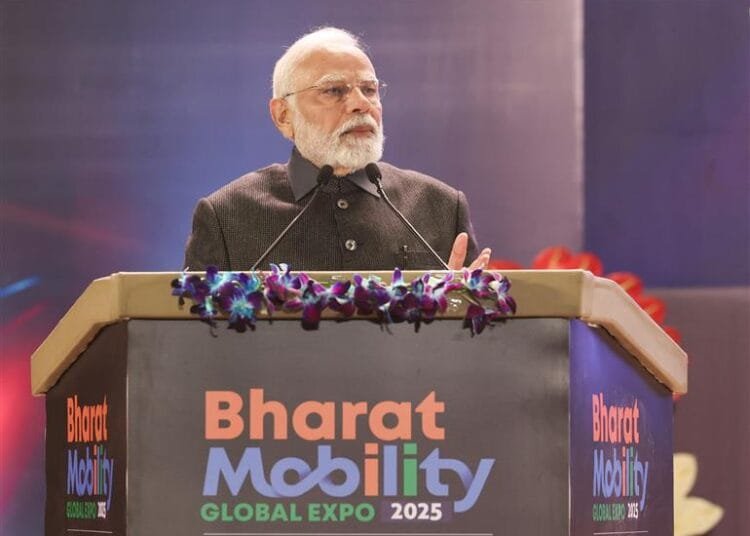Auto sector attracted over US$36bn in FDI
Indian Auto industry has grown by nearly 12% in the past year, driven by the aspirations of the people and energy of the youth, said the Prime Minister Narendra Modi at the inauguration of Bharat Mobility Global Expo 2025, the largest mobility expo in India, held 17 Jan in New Delhi.
He also reminisced Ratan Tata and Osamu Suzuki during the grand event of the Indian Auto sector, noting contributions of both the stalwarts in the growth of the auto industry in the country as well as fulfilling the dreams of middle-class Indian families.
He expressed confidence that their legacy will continue to inspire the entire mobility sector of India.
“India’s automobile sector is witnessing an unprecedented transformation,” he said, pointing out that the number of cars sold annually in India surpasses the population of many countries – the sale of approximately 2.5 crore cars in a year demonstrates the continuously growing demand in India.
The Prime Minister emphasized that this growth showcases why India is viewed with such high expectations when it comes to the future of mobility.
“India is currently the world’s fifth-largest economy and the third-largest passenger vehicle market,” Modi highlighted, underlining several factors that drive the future of mobility in India, including the country’s large youth population, the expanding middle class, rapid urbanization, modern infrastructure development, and affordable vehicles through the Make in India initiative https://sbi.com.in/.
Additionally, the Prime Minister pointed out that another major customer base is India’s middle class and over the past decade, 25 crore Indians have risen out of poverty, forming a neo-middle class that is purchasing their first vehicles. He added that as progress continues, this group will upgrade their vehicles, benefiting the auto sector.
Over Rs.11 lakh crore was allocated for infrastructure development in the last year’s budget, especially for the ease of travel is now a major priority for India https://www.makeinindia.com/home/.
“Along with good infrastructure, new technology is also being integrated,” he added.
Underlining the comprehensive support provided by the government to the auto sector at every level, Modi remarked that over the past decade, new avenues for FDI, technology transfer, and global partnerships were established in the industry.
The Prime Minister emphasized that in the last four years alone, the auto sector has attracted over US$36 billion in Foreign Direct Investment.
He reiterated the government’s commitment to developing a complete ecosystem for auto manufacturing within India.
Emphasising the rapid growth of electric mobility in India over the past few years, Modi remarked that the sale of electric vehicles has increased 640 times in the past decade. He noted that while only around 2,600 electric vehicles were sold annually ten years ago, over 16.80 lakh electric vehicles were sold in 2024.
He emphasized that the number of electric vehicles sold in a single day today is double the number sold in an entire year a decade ago. The Prime Minister projected that the number of electric vehicles in India could increase eightfold by the end of this decade, showcasing the immense potential in this segment.
Stressing on the continuous policy decisions and support provided by the government for the expansion of electric mobility in the country, the Prime Minister remarked that the FAME-2 scheme, launched five years ago, had provided incentives worth over Rs.8,000 crore https://www.globalevexpo.in/.
He emphasized that this amount was used to subsidize the purchase of electric vehicles and build charging infrastructure, supporting over 16 lakh EVs, including more than 5,000 electric buses. He noted that over 1,200 electric buses provided by the Union government were operating in Delhi.
The Prime Minister highlighted the introduction of the PM E-Drive scheme in the third term, which will support the purchase of around 28 lakh EVs, including two-wheelers, three-wheelers, e-ambulances, and e-trucks.
He informed that approximately 14,000 electric buses will also be purchased for public transport, and over 70,000 fast chargers will be installed across the country for various vehicles.
The Prime Minister noted that the PM E-Bus service has been launched in the third term to support the operation of around 38,000 e-buses in small cities across the country.
Underscoring the continuous support provided by the government for EV manufacturing, Modi remarked that pathways were created for global investors interested in EV car manufacturing in India.
He highlighted that these efforts will help expand the quality EV manufacturing ecosystem and build the value chain in India.
Stressing on the need to continuously promote solar power and alternative fuels to tackle the challenges of global warming and climate change, the Prime Minister remarked that during India’s G-20 presidency, there was a strong emphasis on a green future.
He emphasized that significant work was being done in India on both EVs and solar power. He noted that the PM Suryagarh – Free Electricity Scheme is a major mission for rooftop solar.
The Prime Minister highlighted the increasing demand for batteries and storage systems in this sector. He remarked that the Government had launched an Rs.18,000 crore PLI scheme to promote advanced chemistry cell battery storage.
Modi underlined that this was the right time for significant investments in this sector https://www.investindia.gov.in/.
He urged the youth of the country to start startups in the energy storage sector. The Prime Minister emphasized the need to work on innovations that can create batteries and storage systems using materials available in India. He noted that considerable work is already being done in this area, but it was essential to advance it in mission mode.
Over 9 concurrent shows, 20+ conferences and pavilions were held at the event held from 17-22 January, 2025, across three separate venues: Bharat Mandapam & Yashobhoomi in New Delhi and India Expo Center & Mart, Greater Noida. Fiinews.com









